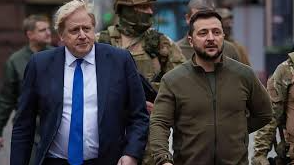
Ukrainian President Dismisses Claims of British Interference, Saying Johnson Had No Role in the Decision
Ukrainian President Volodymyr Zelenskyy has firmly rejected suggestions that former British Prime Minister Boris Johnson played a role in thwarting a potential peace deal with Russia in spring 2022, describing the claims as “illogical.” Speaking to The Guardian, Zelenskyy addressed these accusations for the first time, stating, “There were multiple ultimatums from Russia, and I never agreed to them.”
He emphasised that Johnson was not involved in his decision to halt any negotiations with Russia, adding, “What could he have talked us out of? It simply doesn’t make sense.”
This story, which has resurfaced recently as former US President Donald Trump signals his intentions to broker a peace agreement, has gained renewed attention. Trump is expected to meet Zelenskyy soon, amid concerns that he may pressure Ukraine into agreeing to terms favourable to Russian President Vladimir Putin.
The Russian government has seized on the narrative of Johnson’s visit to Kyiv in April 2022, suggesting that Western leaders, including Johnson, discouraged Ukraine from seeking a peace deal early in the conflict. Johnson himself has dismissed these claims as “Russian propaganda.”
The former prime minister’s visit took place six weeks after Russia’s full-scale invasion, during which he expressed strong support for Ukraine. The notion that Johnson used this trip to prevent Ukraine from signing a peace agreement emerged from an article in Ukrainska Pravda in May 2022, citing sources who claimed Ukrainian and Russian negotiators had reached an agreement in Istanbul.
A week after the Istanbul talks, Johnson visited Kyiv, urging Zelenskyy not to negotiate with Putin, instead advocating for continued resistance against Russia’s aggression. David Arakhamia, a member of Zelenskyy’s negotiating team, seemed to confirm this narrative in November 2023, suggesting that Johnson had directly discouraged any agreement. However, Arakhamia also noted that Ukraine had no intention of signing anything at that time.
Russian President Putin later referenced these comments, claiming that the West, led by Johnson, had pushed Ukraine further into war by refusing peace talks. Zelenskyy, however, dismissed this as a distortion of events, stressing that by the time Johnson arrived, the immediate pressure to negotiate had already diminished.
“The pressure to sign anything had already been lost by the time Johnson came,” said Zelenskyy, explaining that Russian forces had already retreated from Kyiv’s outskirts. He recalled that during the initial stages of the war, Ukrainian leaders had faced both the threat of death and aggressive demands from Russia.
Zelenskyy further explained that the terms offered by Russia in earlier talks were unacceptable, as they violated Ukraine’s constitution and citizens’ rights. “We would never submit to Putin’s ultimatums,” he stated.
The president also highlighted that while several Western leaders had encouraged Ukraine to reach a deal, none were willing to provide the security guarantees necessary to make any agreement viable. After the atrocities committed in Bucha and other towns, any peace deal became far less appealing.
Simon Shuster, a journalist who has covered Zelenskyy’s presidency, suggested that the Ukrainian leader did indeed consider peace talks seriously in March 2022, based on a draft agreement. However, the brutal realities of the Russian invasion, including war crimes, made a deal with Russia untenable.
Zelenskyy further stressed that Johnson’s visit, occurring after significant Ukrainian military gains, made it illogical to claim the British leader pressured him to reject peace. “By the time Johnson arrived, we had already driven the Russians away from Kyiv,” Zelenskyy concluded, emphasising that no one, including Johnson, could have pressured him into such a decision.










